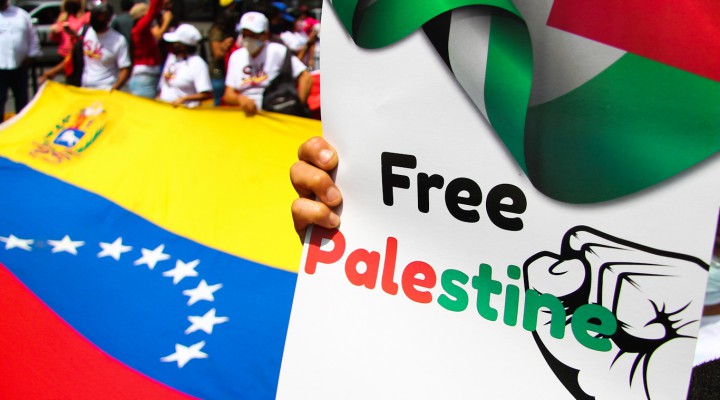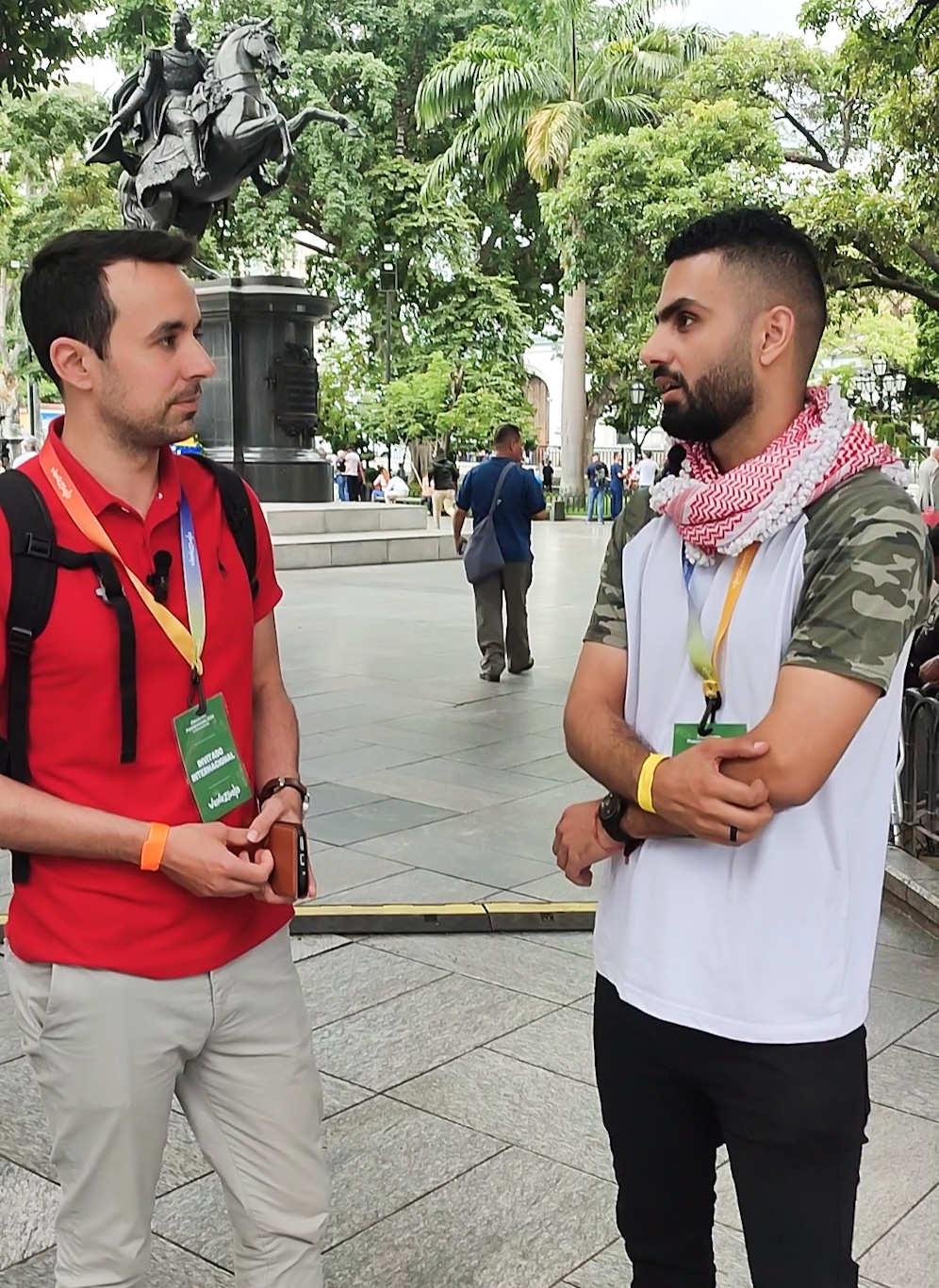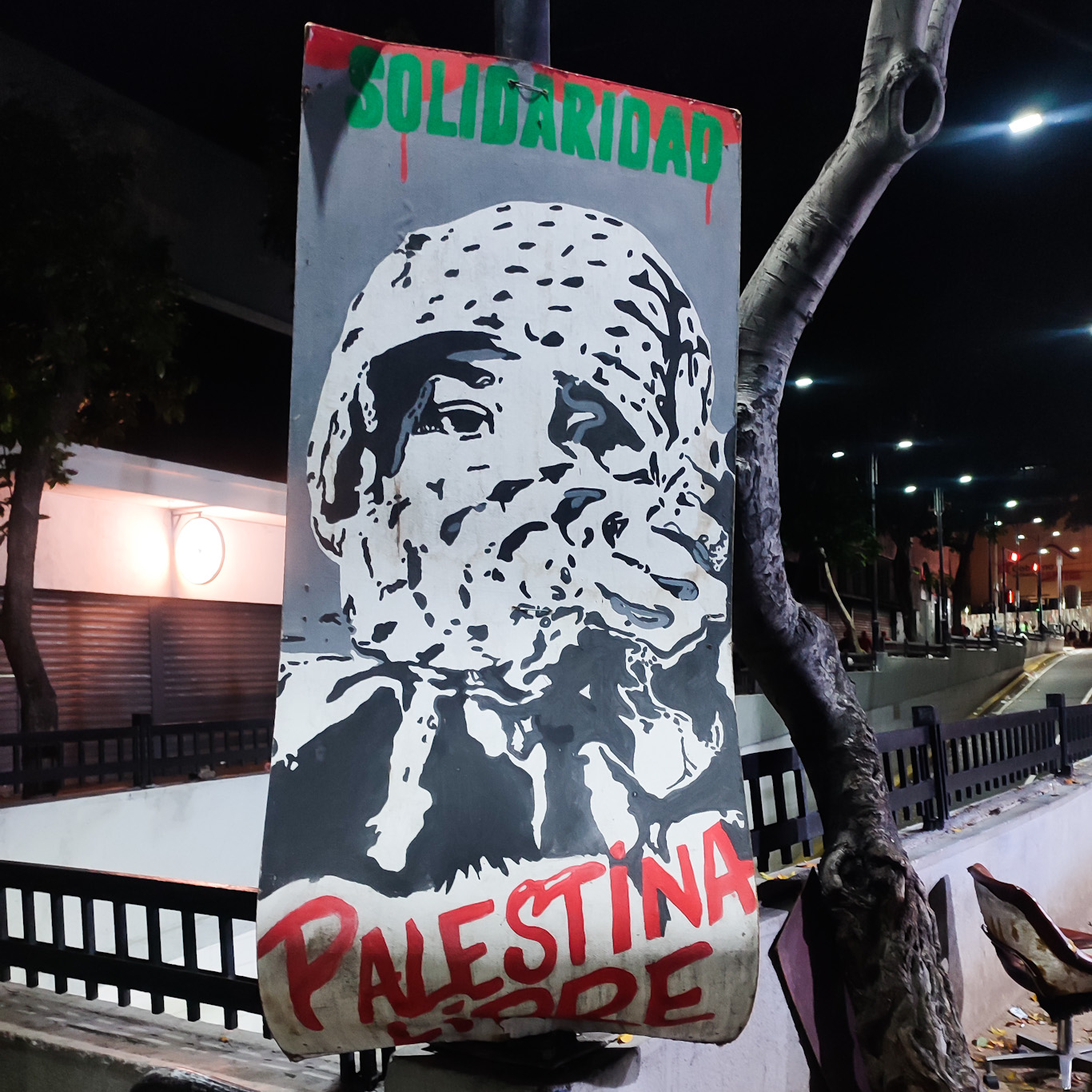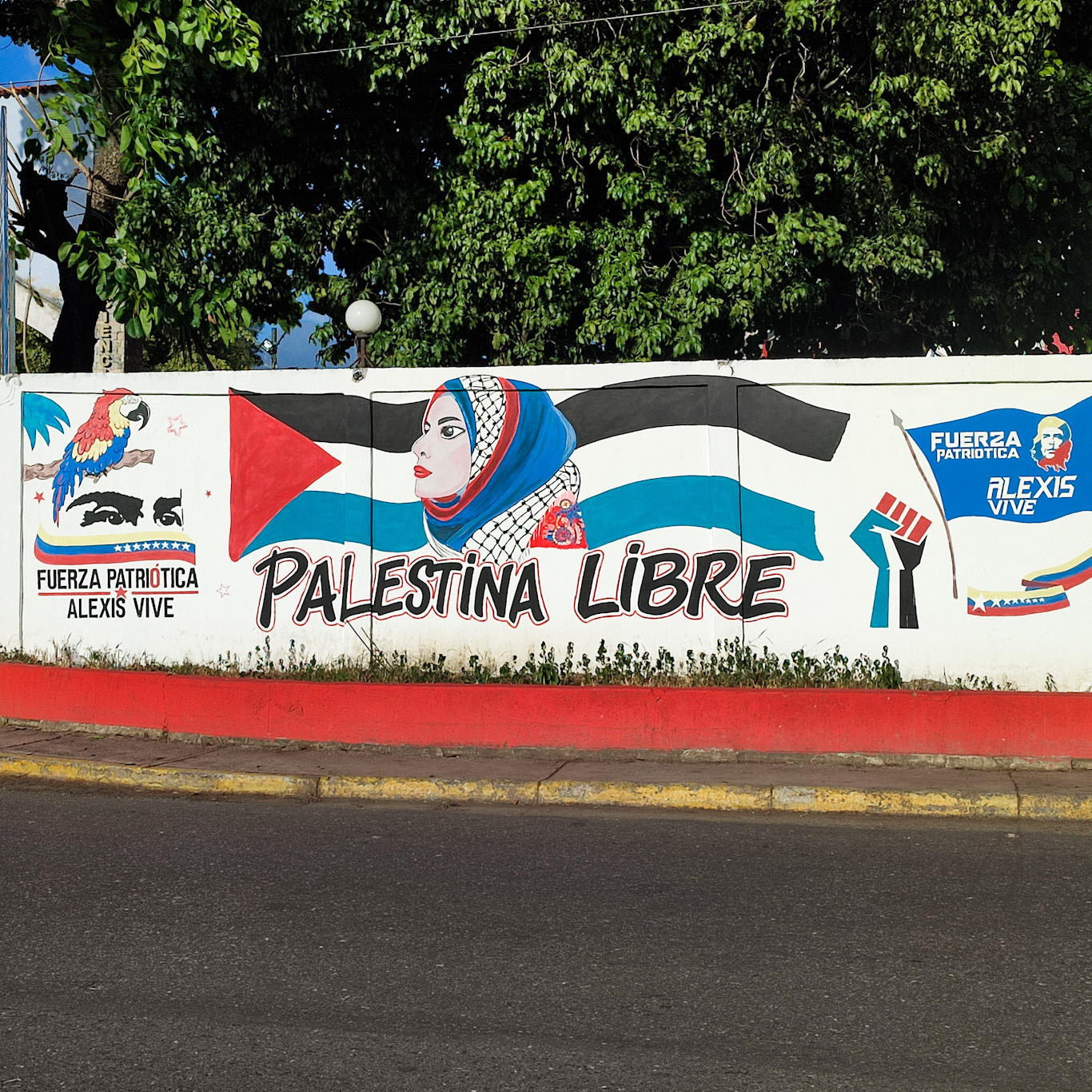Solidarity from Palestine to Venezuela: Meet the Palestinians Observing Venezuela’s Elections

Palestinian election observers in Venezuela reveal shared resistance against imperialism. MintPress explores the unwavering support between the two nations.
President Nicolas Maduro won a third term in office on Sunday, promising to continue and deepen Venezuela’s anti-imperialist Bolivarian Revolution. Many in the U.S. quickly denounced the elections as a sham presided over by a dictatorship.
Yet the proceedings were presided over by more than 900 electoral observers from over 100 countries, including the State of Palestine. MintPress News talked to several Palestinians who observed Venezuela’s elections and, in the process, uncovered tremendous and profound links of solidarity between the two nations, whose peoples and struggles are closer than they might appear at first.
Solidarity Across the Atlantic
Dr. Watan Jamil Alabed, a Palestinian pediatrician currently studying in Cuba, brushed away U.S. claims of authoritarianism. “In Venezuela, as in Cuba, there is a dictatorship of the people. The people make the decisions. They did not vote for Maduro as a person; they voted for the project of the Bolivarian Revolution… for social and economic justice,” he told MintPress when we spoke to him in Caracas.
Palestine is surprisingly heavily featured in Venezuelan politics for a small country nearly 7,000 miles from South America. President Nicolas Maduro sees the Venezuelan struggle against U.S.-led imperialism as one and the same as the Palestinian fight for liberation and self-determination. He has, therefore, been one of Israel’s loudest critics and Palestine’s most ardent defenders, and there is rarely a public appearance he makes without referencing the Israeli attack on Gaza.
“Israel is committing massacres in the Gaza Strip in front of the world’s eyes without anyone deterring it,” he said in a May speech, claiming that Israel’s actions constitute some of the worst barbarity seen since the days of Adolf Hitler. Maduro went on to condemn the European Union as “accomplices” in genocide. Venezuela has sent tons of aid to Gaza despite its difficult economic situation, including food, oil, drinking water, medical supplies, water pumps and mattresses. “Viva Palestina libre!” Maduro said as he cast his vote on Sunday.

“Since October 7 (and even before October 7), you saw unconditional support to the Palestinian people. President Nicolas Maduro was among the first leaders to send humanitarian aid to the Gaza Strip. He denounced the genocide, in all means, and he supported Palestine in all international arenas,” Fadi Alzaben, Palestinian Ambassador to Venezuela, told MintPress. He added that:
President Maduro, his government, and his people are really the true supporters of the people of Palestine. We all share common principles, common ethics. The Bolivarian Revolution shares the ethics of defending the oppressed. And we are an oppressed people. That is why we can count on Venezuelan support.”
Dr. Alabed told MintPress that the concept of solidarity runs deeper in Venezuela. In most countries, solidarity simply means supporting another cause. “But in Venezuela, supporting Palestine and other just causes – they support these causes as their own. Solidarity here is more radical in that sense of the word. Here, it is more than [just] speech; solidarity is an act of life, a way of living…They don’t [just] speak, they act,” he said.
Alabed noted an example of this solidarity in 2014 when Venezuela announced it would train more than 1,000 young Palestinians in medicine for free. These medics returned to their homeland and are currently working, including in the Gaza Strip.
🇻🇪| VENEZUELA VOTA: Nicolás Maduro: “Viva Palestina libre”. pic.twitter.com/YzFesTVouZ
— Alerta News 24 (@AlertaNews24) July 28, 2024
“Venezuela’s Struggle is Israel’s Struggle”
In contrast to Maduro and the socialists, the U.S.-backed opposition closely aligns themselves with Israel and with Zionism. In 2018, its leader, Maria Corina Machado, sent a letter to Prime Minister Benjamin Netanyahu, asking for an Israeli military intervention, writing:
Our population is suffering from the widespread and systematic attack of the current regime. Its criminal nature, closely linked to drug trafficking and terrorism, represents a real threat to other countries, including and especially to Israel. The current regime…closely collaborates with Iran and extremist groups, which, as we all know, threaten Israel in an existential way.”
“A Venezuela renewed in its prosperity and democratic tradition will cultivate a close relationship with Israel,” she promised. But the opposition’s links to the Israeli government run even deeper; In 2020, it signed a cooperation agreement with Netanyahu’s Likud Party, which sees the two groups work closely on a wide range of “political, ideological and social issues, as well as making progress on issues related to strategy, geopolitics and security.”
Although the opposition’s leader for this election was Edmundo Gonzalez, it is understood on all sides that he was merely a conduit for Machado, the real right-wing power broker. On the campaign trail, Machado consistently offered her support to Israel and endorsed Israeli actions in Gaza. “Venezuela’s struggle is Israel’s struggle,” she once proclaimed, explaining that they both stand for “Western values” in the face of opponents who seek to “sow terror, devastation and violence.”
Popular Solidarity
Walking around Caracas, one cannot help but notice the vast amounts of art and political graffiti supporting Palestine. Flags fly from shops and homes, murals of Yasser Arafat and other leaders are common, and many locals wear traditional Palestinian keffiyeh scarves in support.
“The solidarity from Venezuela towards Palestine is united and very profound,” Gassan Salama, a member of the Palestinian Solidarity Movement of the Americas, who came from Panama to observe the elections, told MintPress.
Ambassador Alzaben agreed. “It is part of their solidarity with the Palestinian people, to show their solidarity to the world,” he said of the art that can be seen everywhere in popular areas, adding:
We have seen the crimes in Palestine: in nine months, 40,000 people have been assassinated, most of them women, children or elderly people. The Gaza Strip is totally destroyed. But thousands of kilometers away here in Venezuela, there is support and love for the Palestinian cause and [a rejection of] the Israeli genocide.”

¡Viva Palestina!
The anti-imperialist ideology of the Bolivarian Revolution, started by the late Hugo Chavez, has always drawn parallels with Palestinian efforts to liberate themselves from Israeli occupation. “Since the beginning of the Bolivarian Revolution in 1998, Comandante Hugo Chavez is the one that paved the way to support the people and the cause of Palestine,” Alzaben said.
Unsurprisingly, then, Venezuela has long had a fraught relationship with Israel. In 2006, President Chavez expelled the Israeli ambassador over its attack on Lebanon. Three years later, amid a fresh Israeli attack on its neighbor, Venezuela cut all diplomatic ties and recognized the State of Palestine. In a now-famous speech, Chavez unloaded his anger on Israel, bellowing:
I take this opportunity to condemn from the depths of my soul, from the bottom of my heart: Damn you, State of Israel! Damn you! Terrorists and Assassins! Free Palestine, and long live the Palestinian people! Heroic people! Good people!”
Israel, meanwhile, has supported regime change efforts against Venezuela and was one of the first nations to recognize self-proclaimed U.S.-backed politician Juan Guaidó as Venezuela’s legitimate president. “Israel joins our many allies in the hemisphere in welcoming Venezuela back to the bloc of Western democratic nations that oppose despots and oppression. The people of Venezuela look forward to the reestablishment of diplomatic relations with Israel,” Netanyahu wrote on Twitter, just days after Guaidó announced himself to the world.

Blockaded Nations
Another substantial similarity between Venezuela and Palestine is that both states suffer under crippling economic blockades imposed by their more powerful neighbors. In Venezuela, U.S. economic warfare caused the economy to crash, and the government lost 99% of its international revenues. Inflation was rampant, and shortages of food and basic goods caused massive economic and social pain.
Likewise, in Palestine, Israel controls the movement of people and goods and refuses to let enough food and basic goods into the country. Since October 7, the sadistic measures have been ramped up to the point where it is effectively starving the population of Gaza.
Nevertheless, Venezuela has managed to overcome the worst effects of the blockade. The economy is growing again, inflation is the lowest it has been in decades, and the country – once a huge food importer – now grows 96% of what it eats. “We are not going to give up. We are not going to surrender. We are going to survive,” Maduro said of going forward.
Palestinians are watching the situation in Venezuela intently, knowing that if the Bolivarian Revolution can succeed and overcome imperial domination, so can they. “We think that soon we will celebrate the victory of Palestine, from the river to the sea,” Alabed said.
Solidarity from Palestine to Venezuela: Meet the Palestinians Observing Venezuela’s Elections
Feature photo | A woman holds a banner reading Free Palestine during a march in solidarity with the Palestinian people in Caracas, Venezuela. Javier Campos | AP
 TheAltWorld
TheAltWorld 
0 thoughts on “Solidarity from Palestine to Venezuela: Meet the Palestinians Observing Venezuela’s Elections”